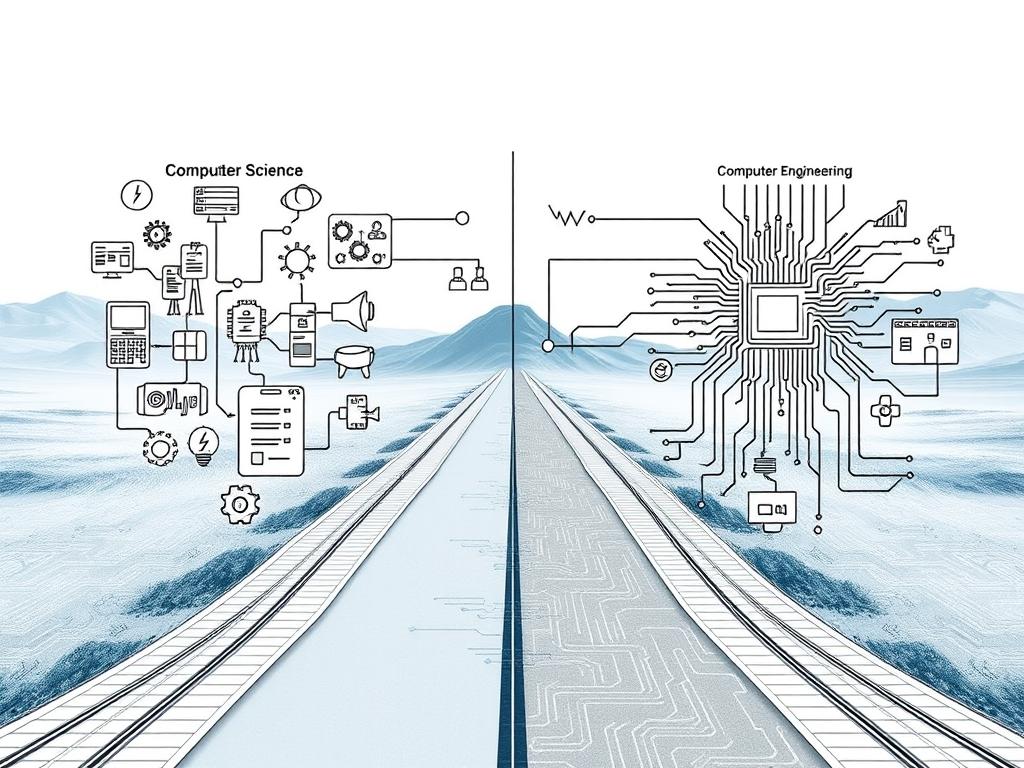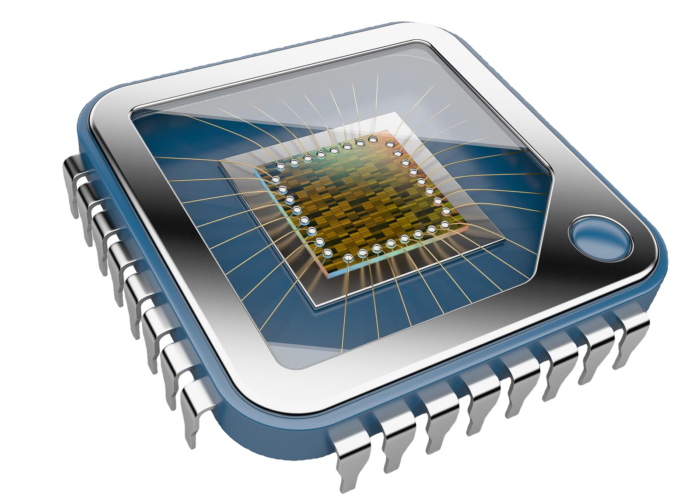Technology’s evolution blurs the lines between computer science and engineering. This creates a dynamic interdisciplinary field that fuels innovation. The relationship between these disciplines reveals a complex landscape of tech advancement.
Computer science and engineering are powerful domains that tackle complex tech challenges. They have distinct approaches but share a common goal. Both strive to create groundbreaking solutions that transform our digital world.
Modern academic programmes recognise the intertwined nature of these disciplines. Students now benefit from integrated curricula in both fields. These courses explore programming, algorithms, and hardware design.
They also delve into emerging tech like artificial intelligence. The synergy between these fields continues to push technological boundaries. This offers exciting opportunities for professionals passionate about solving real-world problems.
These experts use innovative tech solutions to address complex issues. Their work shapes the future of our digital landscape.
Understanding the Fundamentals of Computer Science and Engineering
Computing disciplines are ever-changing, reshaping our tech interactions and problem-solving methods. Computer science and engineering blend theory and practice, pushing innovation’s limits.
These fields combine deep technical know-how with creative problem-solving. They develop intricate solutions that drive technological progress.
The Evolution of Computing Disciplines
Computing has come a long way, with key milestones shaping its journey. These include shifts from early machines to advanced digital systems.
- Transition from early computational machines to advanced digital systems
- Emergence of sophisticated programming languages
- Development of complex algorithmic methodologies
- Integration of artificial intelligence and machine learning
Core Principles and Methodologies
Computing’s core principles cover several vital areas. These form the foundation for technological advancements across various sectors.
| Principle | Description | Primary Application |
|---|---|---|
| Algorithmic Thinking | Systematic problem-solving approach | Software Development |
| Systems Design | Architectural framework creation | Hardware and Software Integration |
| Data Abstraction | Complex information simplification | Advanced Computing |
Industry Standards and Professional Requirements
Computing professionals must constantly learn and adapt to meet industry standards. They need to keep their skills sharp and stay ahead of the curve.
- Cutting-edge technical skills
- Robust mathematical foundations
- Comprehensive understanding of emerging technologies
- Strong analytical and problem-solving capabilities
The future of computing disciplines promises unprecedented opportunities for innovation and technological transformation.
Is Computer Science Related to Engineering?
Computer science and engineering are closely linked in the world of tech innovation. These fields work together to create powerful solutions. Their collaboration drives technological progress in many areas.
Both disciplines share key elements that enable effective problem-solving. They aim to develop cutting-edge tech solutions. However, each field has its unique approach.
- Computer science focuses on theoretical computing and software development
- Engineering emphasises hardware-software integration and practical implementation
- Both disciplines require strong analytical and technical skills
These fields work together to tackle complex tech challenges. Interdisciplinary connections allow experts to share unique insights. This teamwork leads to innovative solutions.
“Technology thrives where different disciplines intersect and collaborate.”
| Discipline | Average Annual Salary | Projected Job Growth |
|---|---|---|
| Computer Science | £91,500 | 23% by 2032 |
| Computer Engineering | £88,700 | 5% by 2032 |
As tech evolves, the lines between computer science and engineering blur. This creates exciting opportunities for innovation. It also opens up new paths for professional growth.
Key Differences Between Computer Science and Computer Engineering
Computer science and computer engineering are two distinct paths in technology. They offer unique opportunities for aspiring tech professionals. Each field has its own characteristics that set them apart in the rapidly evolving technological landscape.
Focus Areas and Specialisations
Computer science mainly focuses on software development and algorithmic design. It also delves into theoretical computing concepts. Computer engineering, however, emphasises hardware design and integration of software with physical systems.
- Computer Science Specialisations:
- Software Development
- Data Science
- Artificial Intelligence
- Machine Learning
- Computer Engineering Specialisations:
- Hardware Design
- Embedded Systems
- Electronic Circuit Development
- Network Infrastructure
Educational Requirements and Coursework
Educational paths for these disciplines reflect their unique professional trajectories. Computer science programmes focus on programming languages, algorithms, and computational theory. Computer engineering courses include more hardware-focused subjects like electronic circuit design and microprocessor engineering.
Professional Applications and Career Paths
Computer science and engineering offer diverse opportunities across technology sectors. Computer science graduates often become software engineers, data scientists, and mobile app developers. Computer engineering professionals typically work as hardware engineers, electronics architects, and systems designers.
The median annual salary for computer and information research scientists reaches $126,830, highlighting the lucrative potential of these technological careers.

Career Prospects and Industry Demand
The tech industry’s growth offers vast job opportunities for computer science and engineering professionals. Recent data reveals an exciting landscape of career potential. This dynamic field continues to soar, creating unprecedented prospects.
Computer engineers’ salary potential shows remarkable resilience and attractiveness. The median annual salary reaches an impressive $128,170. Salaries vary across different specialisations and experience levels.
- Entry-level professionals can expect around $76,000 annually
- Mid-career engineers often earn $95,000
- Advanced roles in computer systems management can command up to $159,010
Geographical opportunities further enhance career prospects. States like California, Washington, and Virginia offer particularly lucrative environments. In these areas, tech professionals earn average annual wages between $136,000 and $170,000.
The projected job growth underscores the field’s robust potential. Various specialisations demonstrate promising trajectories:
- Software engineers: 17% job growth
- Network engineers: 13% job growth
- Hardware engineers: 7% job growth
Educational investment significantly impacts career trajectory. Professionals with advanced degrees consistently secure higher-paying positions. Doctorate holders potentially earn up to $131,000 annually.
The tech industry isn’t just growing—it’s transforming, creating unprecedented opportunities for innovative professionals.
Skills and Competencies Required in Both Fields
Computer science and engineering require a robust set of skills beyond technical knowledge. Professionals must blend technical prowess with adaptive thinking. This combination is crucial for success in these dynamic fields.

Technical skills are vital in computer science and engineering. A strong foundation in programming languages is essential. These languages are key to modern technology development.
Technical Skills and Programming Knowledge
Mastering programming languages is crucial for career growth. Key languages to focus on include:
- Python (50% increase in job listings)
- Java (40% of software development job requirements)
- C# (30% growth in job postings)
- JavaScript
- C++
Problem-Solving and Analytical Abilities
Problem-solving skills are fundamental to success in these fields. Employers consistently rate critical thinking and analytical skills as top priorities. 90% of IT professionals say attention to detail is essential for job performance.
Professional Development and Continuous Learning
Continuous learning is a must in technology-driven careers. Professionals should expect to:
- Acquire new skills over several months to years
- Stay updated with emerging technologies
- Participate in ongoing professional development
The tech industry values adaptability highly. 75% of computer science positions require effective communication skills. 80% prioritise time management. Professionals must develop a well-rounded skill set beyond technical competence.
Conclusion
Computer science and engineering lead the digital revolution. They offer exciting careers for innovative thinkers and problem solvers. With 27 million software developers worldwide, the industry provides vast opportunities.
Artificial Intelligence, Machine Learning, and Quantum computing create new career paths. The software engineering market is set to reach $1,067.3 billion by 2028. This growth shows the potential for innovation in these fields.
Computer science and engineering continue to generate exciting prospects. They’re reshaping how we tackle complex challenges across various industries. The demand for skilled professionals remains strong.
Computer Engineering roles are expected to grow 9% by 2031. Adapting to new technologies will put you at the forefront of innovation. The future of computing offers remarkable opportunities.
Those ready to explore and innovate can make a significant impact. Whether in software development, cybersecurity, or emerging tech, your potential is boundless.







